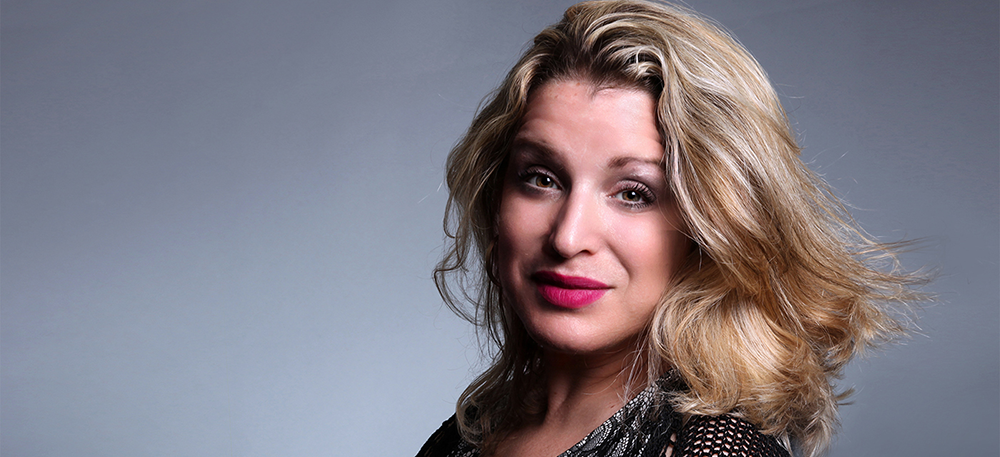
It came from out of nowhere. Jodi Brooks, 46, a managing partner at Finn Partners, a leading integrated marketing agency, had a sudden seizure while talking on the phone — her vision became fuzzy and words no longer made sense. Then her world went dark. She was having a seizure, which nothing in her previous life indicated might happen.
Jodi was ferried quickly by ambulance to NewYork-Presbyterian Brooklyn Methodist, where an MRI showed a walnut-sized lesion in the left temporal lobe of her brain. The news got worse: the lesion was a stage 3 malignant brain tumor. In the blink of an eye, Jodi’s world completely changed.
“This was devastating to say the least,” says Jodi. “It was also shocking, as there is no cancer history in my family. Dr. Ramakrishna told me it was just bad luck.” Jodi and her family were stunned by the news, but knew they were in the best of hands with Dr. Rohan Ramakrishna, a Weill Cornell Medicine neurosurgeon who is the chief of neurosurgery at NewYork-Presbyterian Brooklyn Methodist. He is also one of the country’s top neurosurgeons specializing in brain tumors. Jodi took comfort in being familiar with NYP Weill Cornell, since her family considers it their hospital, and since her mother had been treated there for Parkinson’s disease. That previous experience enabled Jodi to connect with Dr. Ramakrishna, who would be her chief medical advisor and neurosurgeon.
“We don’t understand why these tumors arise,” commented Dr. Ramakrishna. “It’s good news for Jodi’s son that it’s not hereditary, but it’s a great mystery as to how and why they form in some people. What we do know is that they require advanced, multidisciplinary care, with specialists experienced in providing a well-coordinated effort.”
The William Rhodes and Louise Tilzer-Rhodes Center for Glioblastoma at New York-Presbyterian was established for exactly this reason. Dr. Ramakrishna, co-director of the Rhodes Center, explains that Jodi’s diagnosis is certainly serious, but a multi-pronged approach to treatment offers patients the best odds.
"Jodi's tumor was so close to the speech and language areas of her brain that I wanted to do an awake craniotomy," says Dr. Ramakrishna. That's an advanced procedure in which we wake a patient up from anesthesia during the surgery, then 'map' the brain so we can monitor their speech while the surgery is in progress. If I get too close to that 'eloquent' area we know right away and I can stop."
After evaluating Jodi at NewYork-Presbyterian Brooklyn Methodist, Dr. Ramakrishna scheduled the brain mapping surgery at the main campus on the Upper East Side of Manhattan. Dr. Ramakrishna removed about 80 percent of the tumor and Jodi came through the surgery very well, with no loss of language function. But that was just the beginning.
“The problem with malignancies like this is that even a single cell remaining in the brain can start to replicate,” says Dr. Ramakrishna. “Removing the bulk of the tumor eliminates symptoms by relieving pressure on the brain, and it slows down its growth, but you need to follow up immediately with nonsurgical treatments to seek out and treat those remaining tumor cells.”
Over the course of six months Jodi had that successful craniotomy, underwent a six-week course of radiation coupled with daily chemotherapy, and then started a 12-month regimen of intensive chemotherapy treatment under the guidance of neuro-oncologist Dr. Rajiv Magge. Jodi’s brain is scanned every eight weeks to make sure it doesn’t show tumor regrowth. In the meantime Jodi is feeling well. She was back at work just two weeks following surgery and is grateful for the support she’s received from everyone around her.
“This would be difficult enough at any time,” Jodi says. “But experiencing this during a global pandemic has made it much tougher. I’m very grateful for my family and friends, my colleagues, my renowned medical team — they have made it possible for me to get through this.”
Jodi describes herself as “tough as nails,” but admits that the suddenness with which life can change has been an eye-opener. “I never wanted to be part of this tribe they call cancer, nor did I ever imagine being a cancer spokesperson, but it happened and I’ve had time to embrace the experience and own it,” she shared.
When Jodi had the opportunity to spread the word about brain tumors, and the research needed to continue to push for new treatments, she seized it. She helped start Be Bold, Be Bald, a nonprofit born out of the Finn Partners Boston office, which for 12 years enlisted patient networks to raise money for cancer research.
“Cancer doesn't discriminate,” says Jodi. “It can happen to anyone, anywhere, any time. You don’t know when today’s research might provide the cure for you, or for a loved one, so it’s in everyone’s interest to keep the effort going.”
Find out more about brain tumors | More about Dr. Ramakrishna